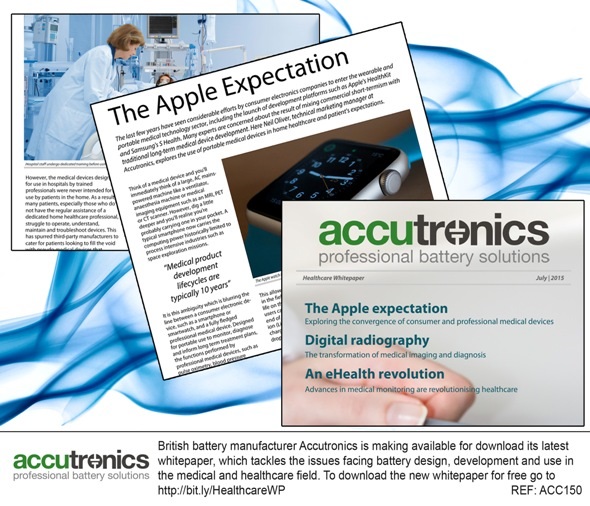Jul 21 2015
Battery manufacturer Accutronics is making available for download its latest whitepaper, which tackles the issues facing battery design, development and use in the medical and healthcare field. The intention is that it will help Original Equipment Manufacturers (OEMs) better understand the possibilities and limitations of rechargeable battery technology in designing products for the medical sector.

The paper is free to download and aims to inform its readers on three main areas of recent battery design interest. The first is a growing phenomenon dubbed the Apple expectation. It explores the convergence of consumer and professional medical devices and how fitness and health monitoring apps designed by large consumer electronics companies such as Apple and Samsung are impacting on the professional medical industry.
The second topic looks at digital radiography (DR) and the increasing challenge to design batteries for modern DR applications that still use analogue equipment. This second piece looks at the latest innovations in digital film processing, the essential features of smart batteries, as well as the regulatory and compliance issues of designing, manufacturing and testing medical devices for worldwide distribution.
Finally, the paper discusses the eHealth revolution, a trend that has witnessed an explosion in the use of smartphones, fitness bands and other wearable technology to monitor acute healthcare conditions in an increasingly ageing population. The piece goes on to look at high profile hospital trials of health apps to monitor patient health, as well as the cost savings the NHS can make from earlier cancer diagnosis.
“We have seen an increasing trend towards smaller, more portable battery solutions in all industries and especially in the medical field,” said Michele Windsor, marketing manager at Accutronics. “With this shift, there has been raised concern about reliable solutions for practitioners in hospitals and other areas where the need for reliable and long-lasting batteries is essential.
“We want to alleviate concerns about battery solutions and ensure that OEMs are informed about the choices they can make so they will not have to rely on inferior, consumer grade batteries.”